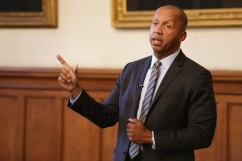
An up-and-coming young leader buys 30,000 Twitter followers from a dubious website. Another seems to have a Wikipedia page set up for himself, full of the kind of obscure details you might expect on a full-blown celebrity profile. A third tells a friend, just starting out in ministry, that he should dedicate at least a third of his time to "building your platform."
These are just three of the many stories I've collected over the last couple of years, as my nagging concerns about Christian platform culture have slowly escalated. I've watched as self-promotion among leaders, speakers and writers has gone from a sin of pride to an act of apparent necessity. I don't think it's ok; in fact I think it's a growing fault line in evangelical Christianity which has the potential to cause devastating earthquakes.
A few years ago, Michael Hyatt's best-selling book – called simply Platform – gave a slightly barefaced set of rules and guidelines to help people build their personal 'brand' in the crowded online world. Trouble was, Hyatt is a well-known Christian (he was the chairman and chief executive of theological publisher Thomas Nelson), and used quotes from famous pastors in the promotion of his book; while he perhaps hadn't intended it to be used by Christian ministers, it has demonstrably taken its place next to the Bible on the bookshelves of some.
Platform gives tips on how to raise your own profile, make your content more sought-after, and ultimately see your bank balance adjust accordingly. That's perfectly fine if you're running a website for baking recipes or trying to carve out a career as a political commentator. When your content is the Gospel of Jesus Christ however, and you've managed to convince yourself that in order to make Him more famous, you'll have to do likewise, something's gone seriously awry.
In the context of a faith that clearly calls us to submission, to becoming 'the very last and the servant to all' (Mark 9:35), self-promotion is a counter-productive descent into personal pride. It turns leaders into competitors rather than fellow-workers, each aiming to reach a seat at the top table of Christian celebrity ahead of the others. And it turns the gospel – the beautiful, transformational true story at the heart of our faith – into a pragmatic justification for personal ambition.
I know for a fact that there are Christian leaders who write to the organisers of major events to explain why they should be given a place on the main stage. Others campaign to force themselves into positions of influence in those events, in the hope of finding their way on to those same platforms. Still others work tirelessly to build needless media careers, after the thirst for fame goes unquenched by popularity within the Christian subculture.
I wrote a couple of articles on this a few years ago, and lots of people sagely nodded in agreement. Nothing changed though, in fact platform culture has become more entrenched in the modern church. So now I just want to throw a window open into the Christian world and yell "Stop! This is ludicrous!" So many of us are complicit in this culture of self-promotion, and yet we're duplicitously carrying on as if it doesn't really matter. Of course it does. If the watching world sees leaders more in love with themselves and their own careers than they are with Jesus, then where does that leave us?

"To live is Christ, and to die is gain" says Paul in Philippians 1, and that's more like it. Christian leadership should be a constant process of self-sacrifice, of setting fire to our own ambitions in the hope that others might be drawn to the light. It's time our leaders – both emerging and established – let go of their own desire for profile; stopped retweeting praise; started turning down media appearances and speaking opportunities when the reward is more about earth than heaven. And everyone else has to stop being complicit in the game, and start valuing the right characteristics in our leaders: compassion, quiet service and humility among them.
I know it isn't that simple. Leaders are by nature going to be influential; they have to take up platforms, both physically and metaphorically. What matters, and what needs to change, is how these responsibilities are sought and handled. We need leaders who genuinely prefer one another; who seek to build each other up rather than jostle for position. And when some of us find ourselves in positions of influence, we have to continually guard ourselves against pride and abuse of position. One of the best ways of doing that is for leaders to surround themselves with people to whom they're genuinely accountable; friends who will tell them when they're starting to believe their own hype or get competitive, and to whom they'll actually listen.
That's my own best effort at repelling the natural draw of platform culture. Because of course, I write this (however awkwardly) as a person of at least some influence. Ironically, I suppose I'm writing these very words in the hope that they'll be influential in church culture. And of course all this is a battle for me too; I can get sucked into the fruitless pursuit of website hits and positive feedback; I too need to realise more and more that my own need for approval and significance is met in Christ, not in retweets, main-stage conference speaking slots and media appearances.
Christianity is, it turns out, a magnificent cover story for selfish ambition. Certain American TV evangelists, viewable every night on British satellite television, give us an insight into the ultimate extreme of that. We're not there yet though; we just need a course correction. Leaders: let's replace self-promotion with submission. Perhaps the people we put on our platforms should be the ones who want to run kicking and screaming from them.
Martin Saunders is a Contributing Editor for Christian Today and the Deputy CEO of Youthscape. You can follow him on Twitter: @martinsaunders

















